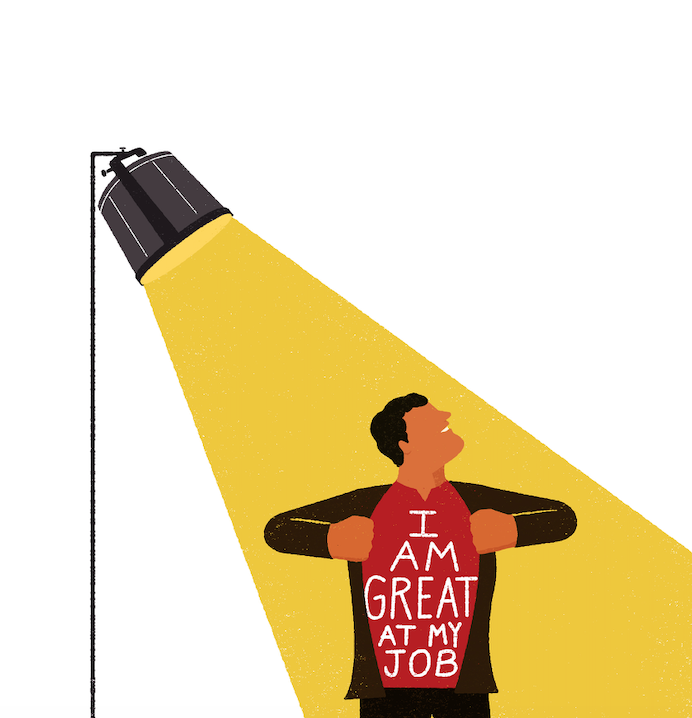Illustration by Martín Elfman
Somewhere along the line, we decided that bragging isn’t included in the category called “work.” Nine times out of 10, a client comes to my company saying, “I’d rather just put my head down and do the work than take the time and energy to brag about it.”
Bragging is Part of Your Work
Being vulnerable, finding the right words, feeling good about yourself, projecting confidence—these are all huge parts of your work. Nobody knows what you’ve done until you make it clear. In an unprecedented time like this one, that idea is doubly important. Many of us are stuck behind screens, making it harder to infer things or drop by one another’s offices to share wins. You can’t ham it up with a colleague in a meeting room or hear about something they’re working on, because everything is on Zoom. You have to be explicit about your successes, especially now, since people are focused on themselves more than ever.
Our economy and media place disproportionate value on volume. In America, we reward loud. We have a terrible inverse relationship between volume and merit, and guess what—it leads to unfair outcomes. Look at any industry. Show me someone posing on the cover of a magazine or giving an important conference keynote, and I’ll show you someone who is there because they are a fantastic self-promoter, not because they are the most qualified.
Bragging gives you the power to be in control of your own narrative. Sure, you can’t control the audience, editors, and critics, but it’s much easier to create the conversation than to change it. Bragging helps you establish your own conversation—around yourself, your work, and your goals.
The Qualified Quiet
If you have done the work, but you don’t know how to talk about and tout it, you’re part of what I call The Qualified Quiet. The Qualified Quiet are experienced professionals who want more than they’re getting, but they’re either afraid of talking about themselves, don’t know how to, or both. Being a member of The Qualified Quiet is not a weakness; it’s a strength. You are essentially the backbone of our society and workforce. You are the majority, not the minority. You are not alone.
Unfortunately, not bragging can hurt your career. I’ve seen clients, friends, and acquaintances miss out on big projects because they didn’t throw their hats in the ring. I’ve watched up-and-coming figures pass up career-altering opportunities because they were too nervous to take them on. They downplay their accomplishments, forgetting that they’ve already achieved goals worth bragging about.
How to Brag Better
The good news is there are two easy steps you can take immediately to help you brag better. The first is to figure out the “superpower” words that describe the way you want to talk about yourself. What are three adjectives you can identify when you step back and think about your voice and what you want to communicate? I like to think of myself as “edgy,” “polished,” and “imaginative,” and if I’m ever unsure of how to word a brag or how to practice a particular introduction, I return to these superpower words and make sure I’m in line with my long-term intention. It’s a baseline for consistency—which is a key to success.
The second step you can take right now is to craft a strong bio—or, rather, three strong bios: one long, one short, and one that’s just two lines. This is a crucial way to introduce yourself, and it’s an often overlooked place to brag better. A wellexecuted bio can help you get hired, gain visibility, and win respect. If a journalist or recruiter cannot figure out who you are in less than 30 seconds (because you have six different bios in six different places), you’ve lost your chance.
Like any other skill, bragging better—being proud of your work and sharing it with others—requires ongoing practice. The more you do it, the better you’ll become at it. During these unprecedented times, you can’t afford not to.
Meredith Fineman is the author of “Brag Better: Master the Art of Fearless Self-Promotion” (Portfolio Penguin Random House) and the founder and CEO of the leadership and communications company FinePoint.
Next-Up: Girl Scouts CEO Sylvia Acevedo on Developing a Competitive Workforce




